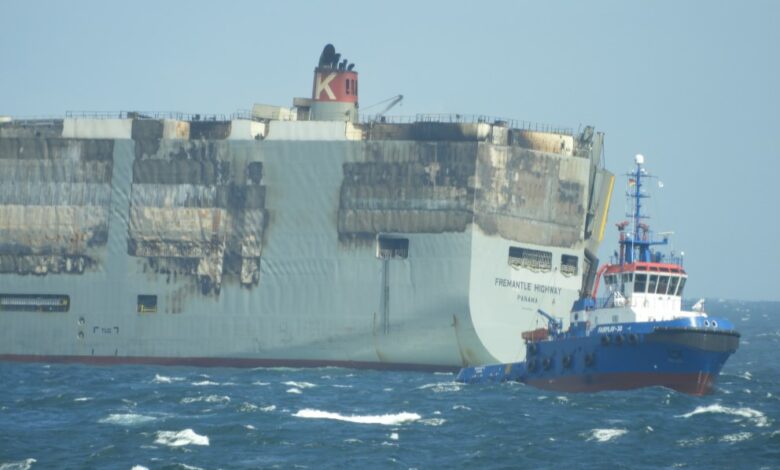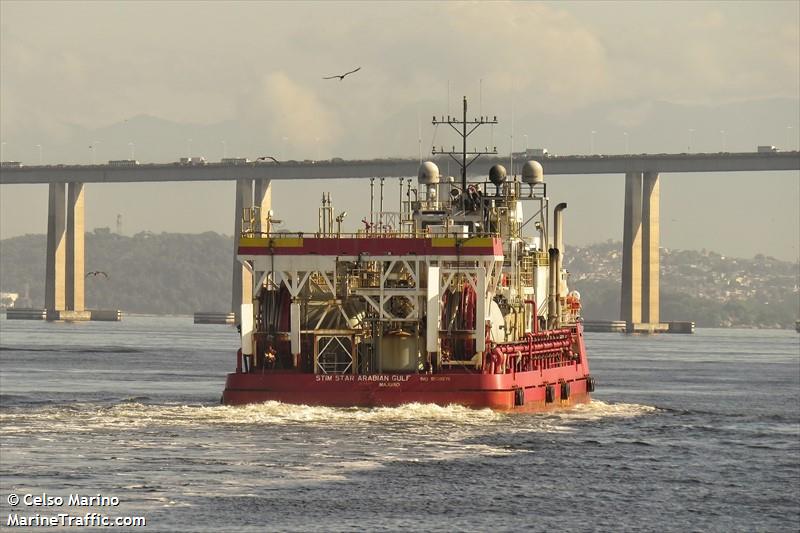Towing of burning Fremantle Highway car carrier underway

The tow of the burning car carrier Fremantle Highway to a temporary location started on Sunday afternoon after being ablaze for several days.
Around midnight on July 25, the Dutch coastguard received a report that a major fire broke out on the vessel. The vessel had 21 crewmen – all Indian nationals, one of whom died. Also on board were the pilot and a superintendent. All of them were rescued by boat and helicopter. The injured crewmembers were taken by ambulance to nearby hospitals with breathing problems, burns, and broken bones. No injuries were life-threatening.
An attempt was made to bring a salvage team aboard the ship on Thursday but was aborted due to the ship still being too hot for anyone to board.
Regardless of the fire still raging, the temperature on the vessel dropped sharply on Friday with a visible decrease of smoke as well. This meant a safer situation for the salvage team which was able to board the ship from the Multrasalvor 4 salvage vessel.
Multraship Towage and the Boskalis-owned Smit Salvage recovery companies established a better towing connection via the top of the ship. After the connection was established the salvage team left the vessel.
The Directorate-General of the Dutch Ministry of Infrastructure and Water Management – otherwise known as Rijkswaterstaat – said that the ship would be towed to a temporary location some 16 km north of Schiermonnikoog. The tow is expected to take between 12 and 14 hours.
However, the towage operation did not begin until Sunday afternoon. By then, the smoke from the cargo ship subsided considerably and an extra towage connection was also established.
The tow of the Fremantle Highway was being done in a controlled manner at a speed of approximately 3 knots by two tugs to the temporary location. Rijkswaterstaat said that its oil control vessel Arca is also nearby. More vessels are on call if any oil pollution occurs.
The exact time of arrival at the temporary destination is not certain and depends on, among other things, the weather conditions, smoke development, current, and tide.
According to a most recent update from Rijkswaterstaat from around 10 AM local time on Monday, the ship must travel another 33 km to reach the new temporary location.
The tugboats will continue their connection to the Fremantle Highway at the new location and the situation will be reviewed upon arrival.
Rijkswaterstaat added that the ship would be towed to a yet undetermined port as soon as the situation on board the ship permits. The appropriate port is being considered during the tow.
The start of towing operations will be a relief for locals of the Wadden Islands as they have already pointed out the massive consequences if the worst were to pass, such as an oil spill or the ship sinking. The Wadden Islands are part of the largest tidal flats system in the world and are a UNESCO World Heritage Site.
While the coastguard claims the source of the blaze is unknown there has been widespread speculation that an electric vehicle is once again to blame. Such vehicles use lithium-ion batteries which, when on fire, can reach temperatures of more than 2,700 degrees Celsius.
There were conflicting reports regarding the number of vessels – both electric and not – onboard the ship. Initially, the Dutch Coastguard said the vessel was carrying 2,857 cars on board, 25 of which were EVs.
Local media then reported that the vessel owner, Shoei Kisen, claimed that there were 900 more cars on board than originally thought, bringing the total to around 3,800.
A spokesperson for K Line, the company chartering the ship, confirmed to Splash that the total number of cars onboard was 3,783 units – all of which were brand new. Of that number, 498 cars were EVs.
The dangers of carrying lithium-ion batteries on ships were highlighted in an Allianz Global Corporate & Speciality report, which ranked fire and explosion as the number one cause of marine insurance losses by value from 2017 to 2021.
“The debate about EVs in the shipping industry is ongoing, with conversations about whether there is a need for dedicated ro-ro vessels for EVs,” Allianz said.

 to a temporary location started on Sunday afternoon after being ablaze for several days.
to a temporary location started on Sunday afternoon after being ablaze for several days.